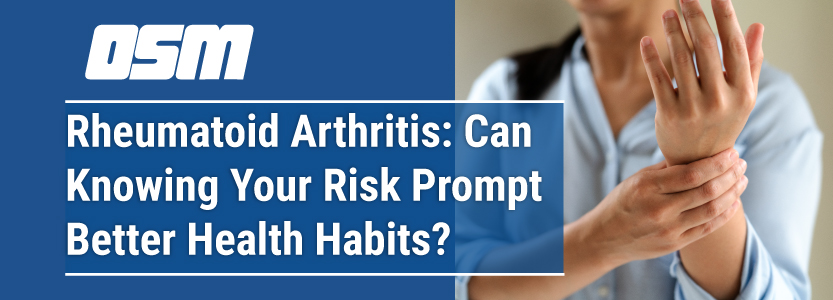Rheumatoid Arthritis: Can Knowing Your Risk Prompt Better Health Habits?
Article featured on Brigham Health Hub
If someone in your family has rheumatoid arthritis (RA), you may already know that you are more susceptible to developing the disease. Could understanding personal risk factors encourage you to change health habits, to possibly decrease your chances of developing RA?
Doctors at Brigham and Women’s Hospital are finding that people who learn their risks – based on genetics, blood markers, personal behaviors, and environmental exposures – are more likely to change behaviors to make them potentially less vulnerable to the disease.
“There are modifiable environmental factors that might have an impact on disease,” says Jeffrey A. Sparks, MD, MMSc a rheumatologist and assistant professor of medicine in the Division of Rheumatology, Immunology and Allergy at the Brigham. “Once you know what the risk factors are and how you can do something about it, you can act on that.”
What Causes Rheumatoid Arthritis?
Rheumatoid arthritis, the most common type of chronic arthritis, is caused by a dysregulated immune system. Symptoms include pain and stiffness in the joints (typically worse in the morning), as well as decreased energy, slight fever, appetite loss, and development of hard bumps beneath the skin near joints.
Progression varies from one person to the next. But when advanced, RA eventually can destroy both cartilage and bone, causing increased pain, swelling, deformities, and loss of mobility. Rheumatoid arthritis is more common among women and often begins between ages 40 – 60 years.
Genes probably don’t cause rheumatoid arthritis by themselves. But genetics may make a person more vulnerable to disease triggers, such as smoking and infections. In RA, the disease occurs in the “synovium” (the lining layer of the joints) when the immune system stops protecting the joints and instead damages bone and cartilage. Researchers at the Brigham and elsewhere are helping to understand the genes, health habits, and environmental factors that may increase a person’s risk of RA. They also are studying how to decrease that risk – including by changing some health behaviors such as smoking, obesity, low fish consumption, and poor dental health. These health behaviors likely affect RA risk by either increasing or decreasing the amount of inflammation in the body.
With these risk factors in mind, Brigham researchers including Dr. Sparks and Elizabeth Karlson, MD, MS are seeking ways to encourage prevention strategies for people at risk.
New Studies Suggest Knowledge Motivates Changes
Knowledge of risks is the first step to changing behavior. But what is an effective way for people to learn about their risks?
As part of the recent PRE-RA Family Study, Brigham researchers found that first-degree relatives of RA patients were familiar with the disease and symptoms. But they were relatively less aware of how their own health habits (including dental hygiene, smoking, overweight/obesity, and diet) could contribute to their risk of developing RA. In the study, those who received an interactive, web-based RA education tool that visually depicted their own personal risks showed greater increases in their knowledge of RA risk factors than those who received education that was not personalized to their own risks.
More importantly, the PRE-RA Family Study also showed that people would act on this new knowledge. Relatives who learned about their own personal risk of RA — based on genetics, autoantibody results from the blood, and their own behaviors — showed increased motivation to improve RA risk-related behaviors. The education included an interactive, visual presentation of their own risks, personalized for each participant, along with specific behavior changes (such as “eat more fish”) that might reduce those risks. Six months later, people who received personalized risk assessment and education, compared to those who received non-personalized information and education, were more likely to have increased fish intake, quit smoking, and brush and floss their teeth more frequently.
What You Can Do Right Now
For relatives of people with RA, but who themselves do not have RA symptoms, knowing and tracking your own personal health history is a good first step. The next is to be aware of how behaviors can affect your risk. Then pick actionable, attainable goals to reduce that risk, such as improved dental hygiene, quitting smoking, and maintaining a healthy weight.
The Orthopedic & Sports Medicine Center of Oregon is an award-winning, board-certified orthopedic group located in downtown Portland Oregon. We utilize both surgical and nonsurgical means to treat musculoskeletal trauma, spine diseases, sports injuries, degenerative diseases, infections, tumors and congenital disorders.
Our mission is to return our patients back to pain-free mobility and full strength as quickly and painlessly as possible using both surgical and non-surgical orthopedic procedures.
Our expert physicians provide leading-edge, comprehensive care in the diagnosis and treatment of orthopedic conditions, including total joint replacement and sports medicine. We apply the latest state-of-the-art techniques in order to return our patients to their active lifestyle.
If you’re looking for compassionate, expert orthopedic surgeons in Portland Oregon, contact OSM today.
Phone:
503-224-8399
Address
1515 NW 18th Ave, 3rd Floor
Portland, OR 97209
Hours
Monday–Friday
8:00am – 4:30pm



